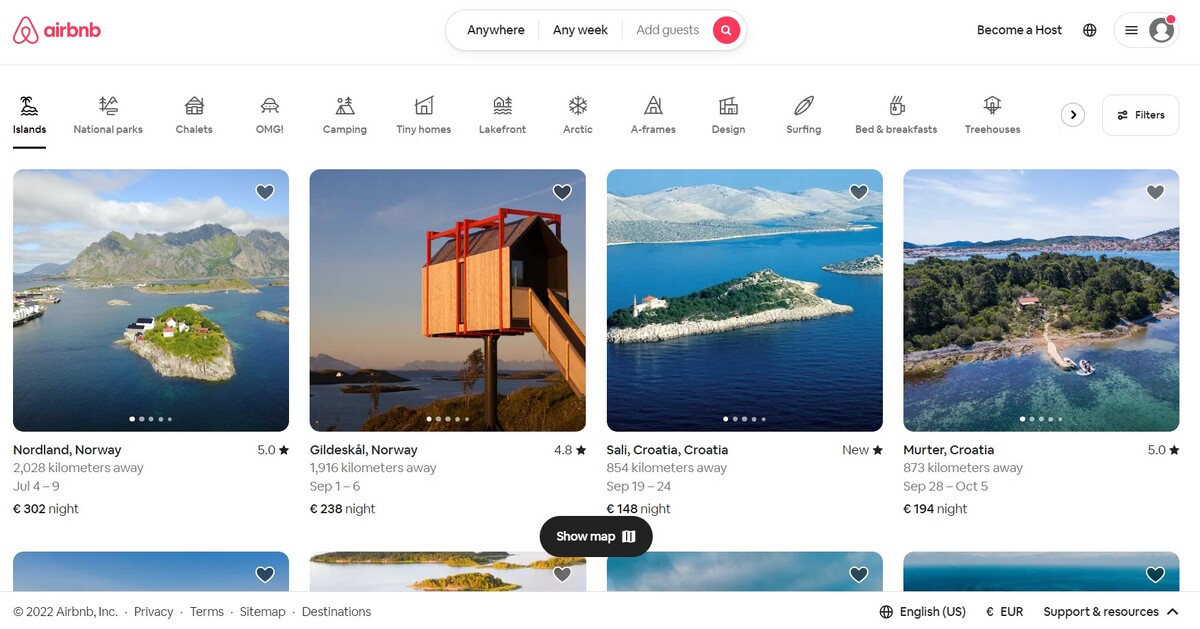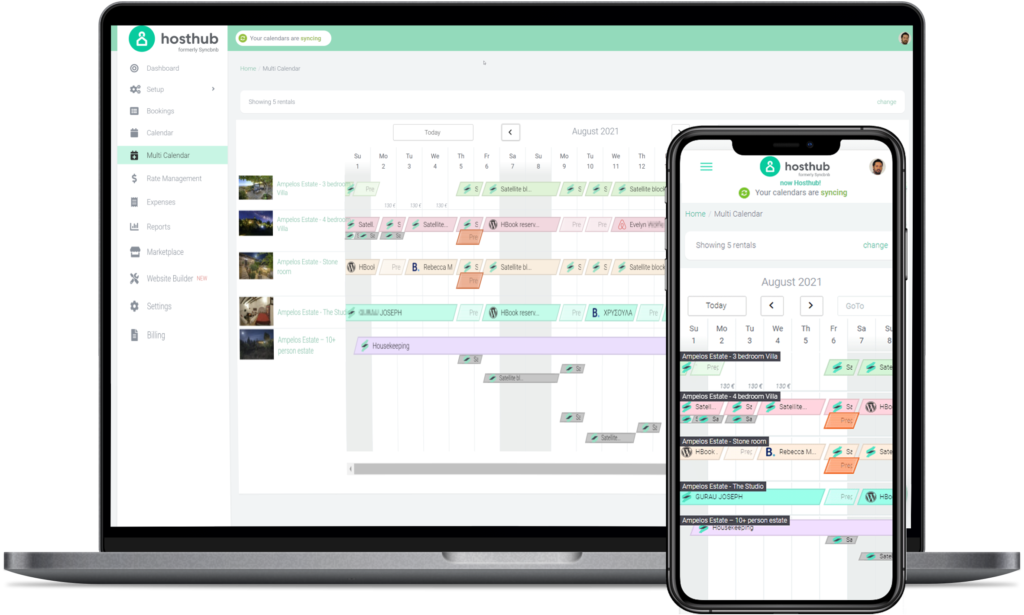
In May 2022, Airbnb made a number of different changes to its platform that were designed to improve the user experience when searching for properties. This included launching a number of new categories and refining and standardizing listing titles in an attempt to make it easier for guests to find the perfect listing for them.
Soon, however, their support was swamped with complaints that the new changes were negatively impacting their business. Some hosts were reporting that they were not getting any bookings at all under the new system, or if they were, the number of bookings was far lower than the normal number of bookings they would expect based on their previous performance.
How has Airbnb responded to this?
To their credit, the team at Airbnb spent some time listening to feedback from its hosts – after all, they are the ones that generate money for the platform. After receiving the feedback, Airbnb decided to take a step back, evaluate its changes and rectify some of the issues that hosts were experiencing in three key ways:
They will reinstate the ability for hosts to write their own Titles…But with a few restrictions
One of the main complaints of Airbnb hosts was that the host-written listing titles were completely removed from the search results. The reason why this was done in the first place was so that users searching the platform for properties could see the same style of title to help them compare properties easily. However, hosts were unhappy with this, as the listing title is one of the first things that a potential guest sees when searching for somewhere to stay – therefore, they wanted to make their title stand out from others and highlight unique aspects of their listing.
On the 17th of June, Airbnb responded to this by changing its guidelines for listing titles – once again, starting by June 30, the host-written listing titles are returning to guest search results.
The new guidelines do come with a number of suggestions to help improve how your title will look when on the search results page – including keeping the length to less than 32 characters, writing the title in sentence case instead of all capitals, and avoiding symbols and emojis that are unrelated to the listing itself. You can have more info about the new guidelines for the titles here.
They will make the “All Homes” category more prominent (and maybe even set it as default)
Another complaint from Airbnb hosts was that they felt their listing was not as visible as it was before due to the introduction of additional categories. Through its host question and answer post, it explained that there were a number of different factors that affect listing performance – which include seasonality, location, and economic conditions. They explained that some guests use the Airbnb categories to look for inspiration or filter down their options if they are looking for a certain type of accommodation.
However, they did go on to state that the vast majority of guests on Airbnb still use the traditional booking method to find their host – by using the normal search function where they enter the location of where they would like to stay and the dates that they are looking to travel in. Airbnb has reassured its hosts that when booking this way – the results are gathered from the ‘all homes’ category meaning that their listing will be visible if within the area that the searcher is looking for.
On top of this, Airbnb has committed to making the ‘all homes’ tab more prominent to further boost all listings within the selected area. They are currently renewing the booking experience including refining map searches and looking for new ways to highlight hosts’ positive reviews to potential guests – and aim to come back in July with new details on this, after listening to what Hosts have to say and taking on board their opinion.
They will create a way for hosts to see which categories their homes have been assigned to

Finally, many hosts highlighted that they were not opposed to the idea of categories to help users narrow down what they are looking for and saw the benefits for guests looking to refine their search. Airbnb agreed with this, stating that categories helped show off the diversity of different listings on their site, and stated that they believed that all listings would fall into one or more categories, where they could be further highlighted to potential buyers. Many hosts have gotten on board with the idea of categories – suggesting additional categories to Airbnb such as sustainable homes or listings that are family-friendly, which Airbnb is taking on board and evaluating.
One area for improvement highlighted by hosts, however, was the ability to let hosts see which categories their homes were being displayed under. Airbnb has listened to this feedback and is working towards this process, with progress on the issue being available in a few months.
While this process is underway, there are a few things that hosts can do in order to ensure their property is listed in appropriate categories such as updating listing details so that they are accurate and complete, as well as ensuring high-quality, clear photographs showing off their space.
How to ensure your property’s success

As you can see from the information above, it is clear that Airbnb has listened to the host’s opinions and feedback on the changes they have made and are clearly willing to admit that some of their changes may not have been successful. Instead of sticking to its changes, the company has responded by improving or updating its policies to ensure that Airbnb hosts are happy with the platform – and this is impressive.
There are, however, other ways to ensure your property’s success so that you can make maximum profit from your space. Let’s take a closer look at some of our top tips:
Make sure your Airbnb title displays your property’s potential
Firstly, it is important to ensure that your listing grabs the attention of those browsing on the Airbnb site – titles should be catchy, directed towards your target audience, and packed with information on what makes your property stand out. This includes highlighting the top features, amenities, and benefits that guests should know about to get them to book with you. You can read more info on how to create titles that stand out here.
Communicate with Airbnb
Many Airbnb hosts were unhappy with the changes that Airbnb implemented – but instead of simply complaining about it and having their business suffer, they informed the team at Airbnb about their concerns. It is vitally important that if you have any issues with the Airbnb platform – no matter how big or small, you report them. Often, issues go undiscovered or unrecognized on platforms such as this for longer than they should because too many people assume that someone else will report it and do nothing.
Don’t depend on One channel
Our last tip is simple, but important – do not just rely on Airbnb to promote your rental. Instead, choose to list your property on a number of different websites such as VBRO, Βooking .com, or Houfy.
Another way to advertise your property is to create your own website, where you can accept direct bookings. While this may be more work initially, this will come with a reward as you will not have to pay third-party fees out of your profits.
There are a number of channel managers that you can use, such as Hosthub, to help sync your property’s availability and rates across multiple channels, meaning that you do not need to worry about double-bookings.
On top of this, having social media pages that show off your property with links to your Airbnb listings is a great way to drive traffic to your property, even if it is not being highlighted in the Airbnb categories and listings.
The take away
Although Airbnb received some criticism for its recent changes, there is no arguing that it is listening to its hosts and working to improve their experience, as well as the experience of Airbnb guests. Every business tries to make changes, and not all of these work at first, but what is more important is how they respond to the feedback.
From a host’s point of view, the most important thing is to give feedback to the Airbnb team informing them about its concerns, giving them the opportunity to rectify these and provide a great seller experience.



